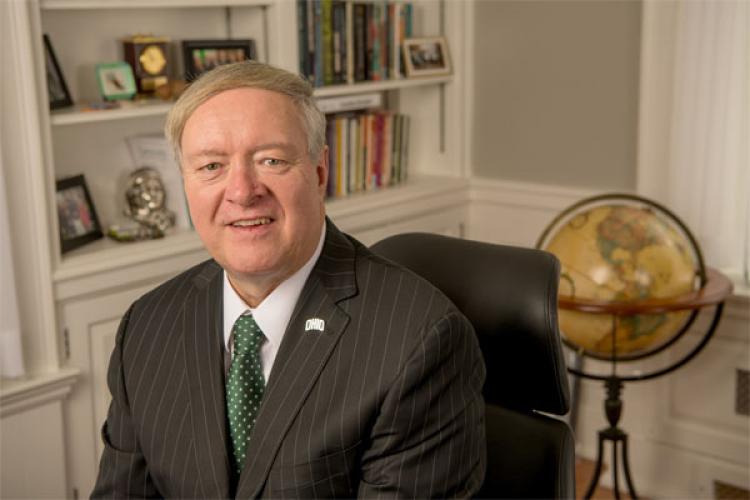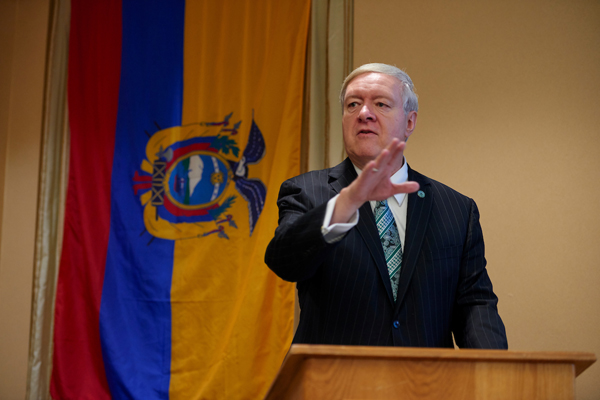
M. Duane Nellis gets lifetime achievement award for service to environment and higher education

From the Kansas Flint Hills to the Kalahari Desert, President Emeritus and Trustee Professor M. Duane Nellis has explored the world via planes, trains, automobiles—and satellites.
Nellis has been named a 2023 Fellow of the American Association of Geographers, a lifetime achievement award recognizing his expertise in the field of geography, particularly remote sensing, and his leadership roles in higher education.
Despite making his mark using emerging technologies in his research mapping land use and environmental impacts, Nellis didn't start college as a geography major.
"I have always been interested in the environment, travel and exploring new places and seeing new landscapes, but it wasn’t until part way through my second year of college that I discovered geography. My wife, Ruthie, (at the time my girlfriend) was a geography major, and the courses she was taking seemed so much more interesting to me than the major I was in and the courses I was taking," he said.
"Once I understood more fully the range of career possibilities in geography, I decided to become a geography major. It was a joy to be part of the geography program at my undergraduate institution (Montana State University), and that institution had an excellent group of geography faculty who were very student-centered," he added.
Nellis launched his graduate career about the same time that NASA and the U.S. Geological Survey were launching Landsat, the first environmentally focused satellite.
"Landsat launched in 1972 and continues to this day (Landsat 9 was launched in 2021), providing a wealth of remote sensing data feeding my curiosity and contributing to my research analysis," said Nellis, whose interests in remote sensing developed at his graduate institution, Oregon State University.
"I took a couple of graduate level classes in remote sensing and was also a graduate teaching assistant in remote sensing. Both my master's research and my doctoral dissertation included remote sensing as a key geospatial research technique. I also had the opportunity to work on a research grant with a professor at Oregon State University focused on mapping land-use patterns using satellite data to assess environmental impact for a proposed energy corridor," he said.
At Nellis' inauguration as Ohio University's 21st president in 2017, long-time colleague Kamlesh Lulla extolled Nellis' contribution to the field of remote sensing.
“Dr. Nellis has long been recognized as one of the most prominent scholars in remote sensing, while also integrating remote sensing analysis with geographic information sciences to better understand Earth land systems change,” Lulla said. “His research has been first rate and he has advanced our knowledge of land use change using satellite remote sensing technologies. His work ethic is impeccable.”
In making him an AAG fellow, the association noted that Nellis has published numerous papers in the field of geography and remote sensing and has guided the continual growth of this field, including serving in his long-standing role as co-editor of Geocarto International.
As Nellis looks at his impact on the environment that he cares so much about, his work on vegetation and grazing top his list.
"Probably the most interesting discoveries were algorithms I developed, in collaboration with others, based on satellite data that could be linked to key vegetation vigor indices and response to grazing in the Kansas Flint Hills, and in response to overgrazing on the edge of the Kalahari Desert. I also developed unique algorithms as I investigated elephant impact on the Mopane Forests in northern Botswana, in Chobe National Park area," Nellis said.
Travel became a constant for Nellis as he conducted his research, though he notes that his research tools then were a lot more cumbersome than those used by students today.
"At the time it didn’t seem so funny, but while in Botswana, there were several military inspection sites as I traveled around the country doing my research. At the time I started my research, GPS (Globally Positioning Systems) had recently been declassified from the U.S. military and was available for my fieldwork. The size of these early GPS devices were large—fitting into a large suitcase," Nellis said.
"Of course, the military inspectors, wanted me to explain what this device was that I had in this large suitcase. I guess I was able to explain it well enough, but I think now with a smile about the GPS capabilities we have in our phones today that are way more powerful than those early devices," he said.
Having experienced the diversity of the world, its people, cultures, environments, Nellis "used his bully pulpit to advance diversity, equity, and inclusion efforts at every university in which he served," notes the AAG biography of Nellis, who served as dean of arts and sciences at West Virginia University, provost at Kansas State University, and president at the University of Idaho, Texas Tech, and Ohio University. Expanding opportunities for students to experience and appreciate diversity at home and around the world was part of his legacy at OHIO.
Nellis recommends geography for today's students who are interested in learning more about the world and its human inhabitants.
"Young people should travel as much as possible and experience the tremendous diversity and beauty of our world. Geography is an excellent major to understand more fully the complexity of our world and human-environmental systems, especially with the accelerating challenges associated with climate change," Nellis said.
About the American Association of Geographers Fellows
Nellis is one of 16 geographers from across the country recognized as 2023 AAG fellows for their contributions to geographic research, advancement of practice, and careers devoted to strengthening the field of geography, including teaching and mentoring.
“I am honored and humbled to be named an American Association of Geographers Fellow,” said Nellis, who served as the OHIO’s President from 2017-2021. “I enjoy researching and teaching various dimensions of geography, and I have been proud to work with so many outstanding students, faculty and staff at Ohio University and at several universities throughout my career.”
AAG Fellows are called to address, contribute to and create initiatives to advance the discipline. They also advise the AAG on strategic planning and mentor early-career and mid-career faculty members throughout the U.S.
"AAG Fellows light the way for the pursuit and advancement of geography," said AAG Executive Director Dr. Gary Langham in a press release. "Their work and experience offer insights into the interaction of space and place with the key issues human societies must understand and help solve. We are grateful for their leadership and advice in advancing AAG and the field."
The AAG receives hundreds of nominations each year, and then selects exemplary individuals who contribute to the field of geography in many different ways.
For more information on AAG Fellows and the honor for Nellis, see the AAG website.
